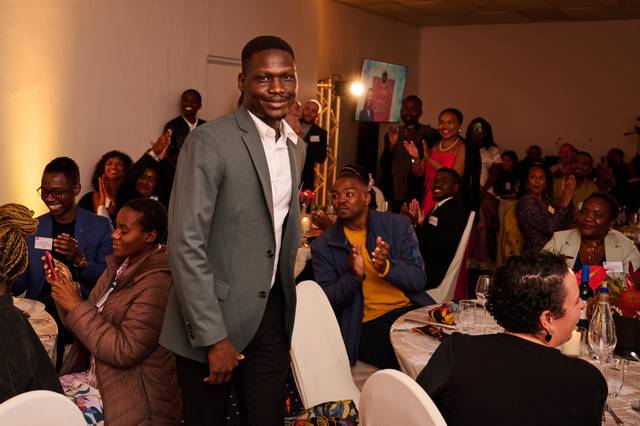
Alumni on the Move
UPDATE: Where are the 2024 Äänit Prize winners now?
Ismail Ombo Dumutu (South Sudan & University of Cape Town, 2022) gives us an update on where things are since winning the 2024 Äänit Prize.
We also chatted with 2024 Äänit Prize winner Ismail Dumutu (South Sudan & University of Cape Town, 2022) to find out about his progress since winning the prize.
His venture, Asili is in the agriculture impact area. Asili empowers smallholder South Sudanese farmers to reduce post-harvest losses by transforming surplus fruit into organic snacks at fair prices to provide vital income.
Why did you enter the Äänit Prize competition?
We applied for the Äänit Prize last year because we felt it aligned with the kind of work we’re doing. When you look at the impact the prize is aiming for—investing in entrepreneurs, especially those with a social impact focus on the African continent—it really resonated with us. We believe the work we’re doing is uplifting a lot of communities.
Why does Africa need your venture?
We are addressing a very important problem: food security. Globally, about a third of all food produced for human consumption goes to waste. In Africa, the problem is even more severe. In South Sudan, for example, 40 to 50% of all food produced is wasted. Meanwhile, many people are starving. It’s projected that about 7.7 million people will be severely food insecure this year—just steps away from famine.
The goal of our venture is to turn the resources God has endowed us with into valuable products. We hope this can help shift mindsets—from exporting raw materials to adding value locally and selling finished products that generate more income.
Right now, we’re helping farmers whose fruits often go to waste because they can’t sell them during peak seasons. In rural areas, fruit is abundant. Everyone has access to it, so there’s no market. But in urban areas, fruits are scarce and expensive—even during the season. Off-season, they’re either not available or too costly. So we’re trying to preserve these fruits when they’re abundant and sell them when they’re most scarce.
That way, we’re helping farmers generate more revenue, to support their families. At the same time, we’re helping our communities see the value of local resources by giving them tools to transform those resources. In doing so, we’re helping address food waste and hunger, and moving toward self-sufficiency.
Which SDG does your venture align with and what do you think are still major challenges the industry?
Our venture primarily addresses SDG 12, especially target 12.3, which focuses on halving global food waste at both the retail and consumer levels, and reducing food losses along production and supply chains.
We’re also addressing SDG 2: Zero Hunger. We believe hunger and food waste are closely linked. If we can reduce food waste, then families will have more food to last longer and even generate surplus they can sell to meet other needs—school fees, healthcare, clothing, or improved nutrition.
One challenge is that while we’re supporting rural communities, they’re not always our direct customers. That means we also need to build strong product-market fit with urban consumers, who are more likely to purchase our value-added products.
What changes has your innovation brought in your country?
We’re still in the early stages, but the response so far has been incredibly encouraging. The 25 farmers we are working with have really embraced what we’re doing and beginning to see the value it brings, a pathway to upliftment. Even just sampling our products has surprised them. They’ve said things like, “We never knew this banana or mango could be made to taste this delicious!”
Fruit drying was attempted in the past, but with poor results due to lack of knowledge and proper tools. Now, farmers are beginning to see that these crops can be preserved and sold in a much better way. We hope to expand access to our drying facilities across the country and reinvest proceeds into the communities—through better schools, clean water, and other community needs.
What have you learned about managing capital since winning the Äänit Prize?
The biggest lesson is: have a plan before you receive funding. During our proposal phase, we thought carefully about how we would use the money. That preparation made managing the funds easier.
Another key lesson is around the banking system in South Sudan. It’s very underdeveloped. We lost a significant amount of money due to withdrawal and maintenance fees—charges that wouldn’t be nearly as high in other countries. We were fortunate to have one of our co-founders who is an accountant. That has helped us maintain accurate records, manage projections, and track expenditures effectively. Good financial management is key to impact.
Where did the Äänit prize money make the most difference in your venture?
The prize money made the biggest impact in upgrading our equipment and improving our facility. We purchased a high-quality dryer, built a proper brick fence, and renovated our processing space. It also drastically increased our processing capacity. To give you an idea: with the equipment we have now, we could process in one week what used to take us an entire season.What have you implemented since winning the prize?
The Äänit Prize has been a game changer. When we applied, we were using locally made solar dryers, but they were difficult to control and didn’t deliver consistent results, especially for sensitive fruits like mangoes. Thanks to the prize, we were able to buy a commercial dehydrator from Japan. It allows us to fine-tune the drying process and produce high-quality results.
We also upgraded our processing site—replacing a bamboo fence with a brick wall and renovated inside the facility. We’re now ready to move into production, although unfortunately we completed the upgrades just after the peak fruit season. So, we’re using this time to prepare and test the new setup before full-scale production starts later this year.
Did you learn anything significant through the application process that you’d like to share with 2025 applicants?
One thing I’ll say its: just apply! Whether your venture is at early or mature stage, go for it and give it your best. Secondly, tell the whole story of your venture. Sometimes we think certain milestones are too small to mention—but share them as someone might connect with your story. And don’t give up!
What do you think makes a profitable social impact venture?
The most important thing is understanding the need you’re trying to meet. Profit is important, but it shouldn’t be the primary focus. First ask: are the people you aim to serve actually benefiting? Often, the communities we work with aren’t our direct customers. So we have to understand both the social issue we’re addressing and who our paying customers are. If you can get both sides right—solve a real problem and make a product that’s irresistible to customers—then profits will follow.
When you scale, you're scaling both impact and revenue. And just like any true social impact venture, part of that revenue should be reinvested in the communities you serve.
What’s next for you?
The future is looking bright. We’ve laid the groundwork to build a successful and sustainable company, and we’re ready to start production at scale. We’re also applying for grants to make our operations more eco-friendly. For example, we’re currently using a generator to power our dehydrator, and we want to transition to cleaner energy.
We’re open to equity investments too—as long as it’s the right fit. If someone wants to invest, we’re happy to have that conversation. We want partnerships that are mutually beneficial and help take us to the next level.
We’re also increasing our visibility. We’ve applied for the Youth4Climate fund through UNDP and to present at the African Union’s Startup Program Trade Fair later this year. Our goal is to share the incredible snack products we’ve created with more people across South Sudan, and beyond.







